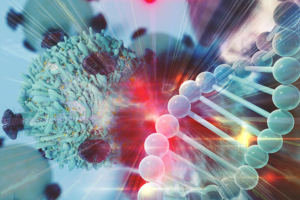 As tumors grow, they often develop various types of mutations (changes in the DNA code) and other genetic abnormalities that help them survive and grow. Researchers are developing new medications that target tumors with particular genetic abnormalities.
As tumors grow, they often develop various types of mutations (changes in the DNA code) and other genetic abnormalities that help them survive and grow. Researchers are developing new medications that target tumors with particular genetic abnormalities.
FGFR (fibroblast growth factor receptor) is a family of proteins that helps cells grow. When the FGFR gene, which provides instructions to make the FGFR protein, is abnormal, the FGFR protein may become overactive and stimulate tumor cells to grow faster. Around 7% of breast cancers have abnormalities in the FGFR gene. Research also suggests that abnormalities in the FGFR gene play a role in resistance to endocrine treatment and CDK4/6 inhibitors. As a result, trials to test drugs called FGFR inhibitors that target the FGFR protein are underway.
Read below to learn more about how FGFR works, recent research into how abnormalities in the FGFR gene may affect treatment resistance and response to FGFR inhibitors, and two journal articles that show a list of FGFR inhibitors that are being tested in breast cancer clinical trials.
General Information About FGFR Abnormalities In Cancer
- Figure 1 in this book chapter shows how FGFR works to increase cell proliferation: Inhibitors of the Fibroblast Growth Factor Receptor
- Massive Bio: FGFR Mutations in Breast Cancer FAQs
FGFR Abnormalities and Treatment Resistance
List of FGFR Inhibitors Being Tested In Clinical Trials
- Journal article (see Table 1): Targeting Aberrant FGFR Signaling to Overcome CDK4/6 Inhibitor Resistance in Breast Cancer
- Journal article (see Table 1): The FGF/FGFR System in Breast Cancer: Oncogenic Features and Therapeutic Perspectives
- Metastatic Trial Search: MBC Trials for FGFR abnormalities
